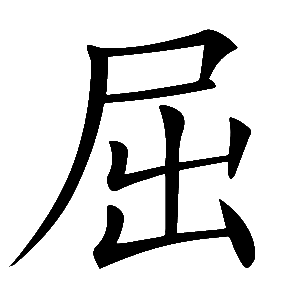Chinese surnames are used by Han Chinese and Sinicized ethnic groups in China, Taiwan, Korea, Vietnam and among overseas Chinese communities around the world such as Singapore and Malaysia. Written Chinese names begin with surnames, unlike the Western tradition in which surnames are written last. Around 2,000 Han Chinese surnames are currently in use, but the great proportion of Han Chinese people use only a relatively small number of these surnames; 19 surnames are used by around half of the Han Chinese people, while 100 surnames are used by around 87% of the population. A report in 2019 gives the most common Chinese surnames as Wang and Li, each shared by over 100 million people in China. The remaining top ten most common Chinese surnames are Zhang, Liu, Chen, Yang, Huang, Zhao, Wu and Zhou.
Cui, alternatively spelled Tsui or Tsway, is one of the 80 most common surnames in China, with around 0.28% of the Chinese population having the surname. It is also one of the most common surnames in Korea, with around 4.7% of the population having the surname in South Korea.
Ou is the pinyin romanization of the Chinese surnames 區 and 歐, which share a common origin with the compound surname Ouyang (歐陽), from the ruling family of the State of Yue during the Spring and Autumn period. They are commonly romanized as Au or Ao in Cantonese.

Lü is the pinyin and Wade–Giles romanisation of a Chinese surname, most commonly 吕 and 呂.

Lì is the pinyin romanization of the Chinese surname written 厲 in traditional characters and 厉 in simplified characters. It is also spelled Lai according to the Cantonese pronunciation. It is listed 247th in the Song dynasty classic text Hundred Family Surnames.

Lì is the pinyin romanization of the Chinese surname written 栗 in Chinese character. It is also spelled Leut according to the Cantonese pronunciation. Relatively uncommon, it is not listed in the Song Dynasty classic Hundred Family Surnames.

Li or Lee is a common Chinese surname, it is the 4th name listed in the famous Hundred Family Surnames. Li is one of the most common surnames in Asia, shared by 92.76 million people in China, and more than 100 million in Asia. It is the second-most common surname in China as of 2018, the second-most common surname in Hong Kong, the most common surname in Macau and the 5th most common surname in Taiwan, where it is usually romanized as "Lee". The surname is pronounced as in Cantonese, Lí (poj) in Taiwanese Hokkien, but is often spelled as "Lee" in Hong Kong, Macau, Taiwan and many overseas Chinese communities. In Macau, it is also spelled as "Lei". In Indonesia it is commonly spelled as "Lie". The common Korean surname, "Lee", and the Vietnamese surname, "Lý", are both derived from Li and written with the same Chinese character (李). The character also means "plum" or "plum tree".

Lu is a Chinese surname. It is also spelled Luk according to the Cantonese pronunciation. Lu 禄 is listed 358th in the Song Dynasty classic text Hundred Family Surnames. Relatively uncommon, Lu 禄 is not among the top 300 surnames in China.

Lú is the pinyin romanization of the Chinese surname written 卢 in simplified character and 盧 in traditional character. It is also spelled Lo or Loh according to the Cantonese pronunciation. Lu 卢 is the 52nd most common surname in China, shared by 5.6 million people, or 0.475% of the Chinese population as of 2002. It is especially common in Guangdong, Guangxi, Hainan, and Hebei provinces. Lu 卢 is listed 167th in the Song dynasty classic text Hundred Family Surnames.

Lóu is the pinyin romanization of the Chinese surname written 娄 in simplified character and 婁 in traditional character. It is the 229th most common surname in China, shared by approximately 350,000 people. Lou 娄 is listed 139th in the Song dynasty classic text Hundred Family Surnames.

Jì is the Mandarin pinyin romanization of the Chinese surname written 蓟 in simplified Chinese and 薊 in traditional Chinese. It is romanized as Chi in Wade–Giles and Gai or Kai in Cantonese. Ji is listed 263rd in the Song Dynasty classic text Hundred Family Surnames. It is not among the 300 most common surnames in China.

Jì is the Mandarin pinyin romanization of the Chinese surname written 冀 in Chinese character. It is romanized as Chi in Wade–Giles, and Kei in Cantonese. Ji is the 294th most common surname in China, with a population of 160,000. It is listed 316th in the Song dynasty classic text Hundred Family Surnames.

Jì is the Mandarin pinyin romanization of the Chinese surname written 季 in Chinese character. It is romanized as Chi in Wade–Giles, and Gwai in Cantonese. Ji is the 142nd most common surname in China, with a population of 960,000. It is listed the 134th in the Song dynasty classic text Hundred Family Surnames.
Wan is the Mandarin pinyin and Wade–Giles romanization of the Chinese surname written 万 in simplified Chinese and 萬 in traditional Chinese. It is romanized as Man in Cantonese. It is listed 162nd in the Song dynasty classic text Hundred Family Surnames. As of 2008, it is the 88th most common surname in China, shared by 2.4 million people. The province with the most people having the surname is Anhui. In 2011, of the top 30 cities in China it was the only the top ten surnames of Nanchang, where it is the fourth-most common name.

Pi is the Mandarin pinyin romanization of the Chinese surname written 皮 in Chinese character. It is romanized P'i in Wade–Giles, and Pei in Cantonese. Pi is listed 85th in the Song dynasty classic text Hundred Family Surnames. According to a 2008 study, it was not among the 300 most common surnames in China. However a 2013 study found that it was the 279th most common name, being shared by 229,000 people or 0.017% of the population, with the province with the most people being Hunan.

Qu is a Chinese surname. The Chinese family name 屈 is transliterated as Wat in Cantonese Jyutping, Yale, and Hong Kong romanization. It is also transliterated as Qū in pinyin. The surname Qu (屈) is listed 124th on the famous Song Dynasty book of common Chinese surnames, Hundred Family Surnames, contained in the verse 熊紀舒屈.

The Jeonju Yi clan is a Korean clan with the surname Yi. Their Bon-gwan is in Jeonju, North Jeolla Province. The clan includes the former House of Yi which ruled the Joseon dynasty and the Korean Empire.
覃 is a Chinese surname that can be pronounced in Mandarin as Tán or Qín, with the latter being common among Zhuang people. A 2013 study found it to be the 96th most common surname, shared by 2,400,000 people or 0.180% of the population, with the province-level unit with the most being the Guangxi Zhuang Autonomous Region.
Hè ), also romanized as Ho, is a Chinese surname that is 71st in the list of the top 100 most common Chinese family names. The Chinese character 贺 means "celebrate" or "congratulate." According to a 2013 study, He was the 86th most common surname, shared by 2,740,000 people or 0.210% of the population, with the province with the most people being Hunan. It is the 70th name on the Hundred Family Surnames poem.
In 2008, pinyin Yán was estimated to be the 75th most common surname in the People's Republic of China, shared by around 3.1 million citizens, making it the most common of the surnames written “Yan” without tone markers.













